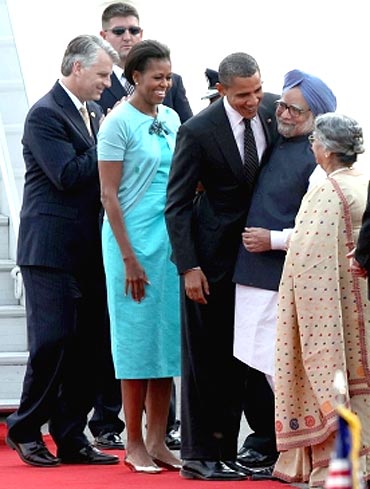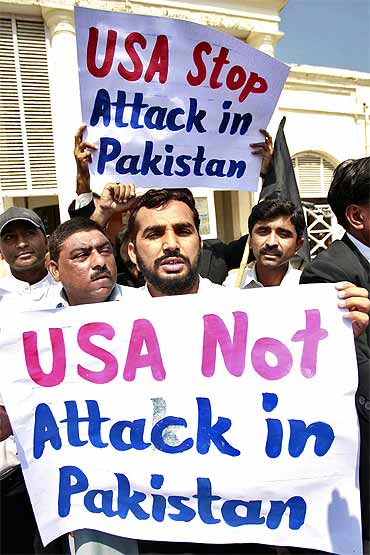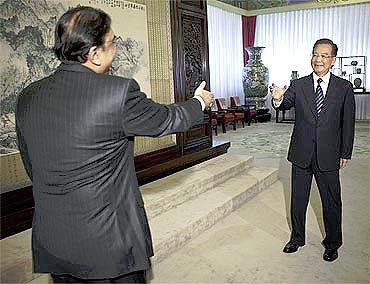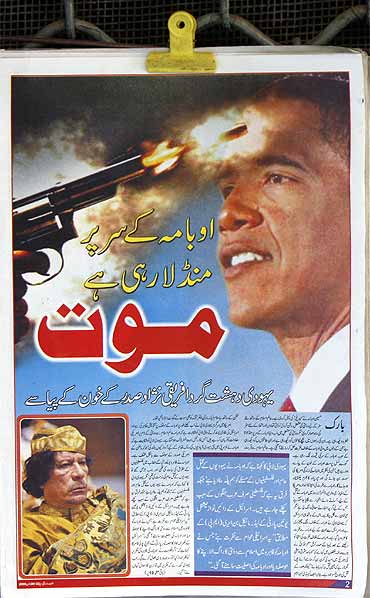 | « Back to article | Print this article |
'US-India bonhomie driving Pakistan deeper into China's arms'
The strengthening ties between India and United States have made Pakistan paranoid. Fearing that US might just discard it, Pakistan is now turning to its "enduring friend" China, believe America's powerful couple in diplomatic circles -- former ambassadors Howard and Teresita Schaffer. Aziz Haniffa reports
Former United States ambassadors Howard B Schaffer and Teresita C Schaffer, considered a power couple in diplomatic and think tank circles when it comes to expertise on South Asia, believe the exponential growth in United States-India relations is leading to paranoia in Pakistan, plunging Islamabad further into China's arms.
Islamabad, believe the Schaffers -- who have served for 60 years between them in and on issues of the subcontinent -- views Beijing as 'an all-weather friend,' unlike the 'fair-weather' Washington.
During the question-answer session that followed the release of their book, How Pakistan Negotiates with the United States: Riding the Roller Coaster, at the US Institute of Peace, Washington, DC, Howard Schaffer said Pakistan was willing to cut Beijing enormous slack even though China had moved closer to the US position on Kashmir, the mother of all issues as far as Pakistan is concerned.
Howard, a professor at Georgetown University's Institute for the Study of Diplomacy, who during his 36-year career in the foreign service served as ambassador to Bangladesh (1984-87), was the political counsellor at American embassies in India and Pakistan through 1974 to 1979 and was twice deputy assistant secretary of state responsible for South Asian affairs.
Click on NEXT to read further...
Pakistan's biggest fear: Will US dump us for India?
He acknowledged that Islamabad always had a problem with Washington moving closer to or having even a halfway decent relationship with New Delhi, let alone the envisaged strategic partnership. Therefore, he believed "it's a more acute problem now."
Pakistan's "great fear," he said, "Is that we will shift to a robust relationship with India and that will inevitably have a deleterious impact on our relations with Pakistan."
Howard argued, "I don't see it, looking back, as the pattern in Pakistan's concern. More broadly, it's just been a question of the United States no longer needing Pakistan, dumping Pakistan, discarding Pakistan -- as some Pakistanis have put it to me, like a used Kleenex -- even as the India aspect has become more important in recent years. There certainly is a contrast between the way Pakistan deals with the United States and the way Pakistan deals with China. China is seen as Pakistan's enduring friend, and they speak -- the Pakistanis do -- of an all-weather alliance."
According to him, Pakistanis welcome the difference between Chinese willingness to let them have their own domestic political world and the tendency of the US to intervene, or at least to comment. "It seems to me that over the years, Pakistan has been far more willing to allow the Chinese in a way to get away with policies which, had they been pursued by the US, would have been the subject of considerable criticism," Howard said.
One example of that, he said, "is the shift in the Chinese position on Kashmir, which had originally been a four-square support for Pakistan and now takes a line, which is not that far removed from ours -- that India and Pakistan should settle the problem bilaterally and peacefully."'With China, Pakistan carries out negotiations with utmost discretion'
Teresita, who also had an over-30-year stint in the foreign service, served as ambassador to Sri Lanka and economic and political officer respectively in Islamabad and New Delhi and also succeeded her husband as deputy assistant secretary of state for South Asian affairs, said, "With the Chinese, Pakistan, as far as we can determine, doesn't play hardball. The negotiations with China are carried out with the utmost discretion. The Chinese style with Pakistan makes it a lot easier to bury problems and, of course, that's reinforced by the relatively closed Chinese society."
'China's position on Kashmir is complicated'
Thus, she said, it was unlikely "the Pakistanis are likely to be very discomfited by that, but I can assure you if they were, Americans would be the last to hear about it from them."
She said the Chinese position on Kashmir was "complicated." She too admitted that China had moved away from its position "of stout support for Pakistan on Kashmir towards a more even-handed position."
But, she added, Beijing had not admitted "a change in their Kashmir policy, but began making life difficult for India on ways that touched on Kashmir. For example, by refusing to issue Chinese visas to residents of Kashmir on their passport and insisting on doing it separately on a separate piece of paper. Moreover, there have been a number of other things, which have made the strategic rivalry between India and China -- brought it much closer to the surface -- in recent years."
Can Pakistan be trusted, wonders US
Teresita, who is still well plugged in with the powers that be at the US state department, agreed. "If you are looking at the civilian side, the two candidates for building that kind of a relationship would be Pakistan President Asif Ali Zardari, who has a kind of problematic past and Pakistan Prime Minister Yousaf Raza Gilani, who is a lovely guy, but his first officials visit to Washington after becoming prime minister was a disaster."
Within the Obama administration, she said, there are "really two competing narratives about Pakistan. There is the Pakistan is an essential ally in trouble that is doing its best narrative. And there is the Pakistan can't be trusted narrative. And these alternate for prominence, depending on what's happened in the past few months."
The Schaffers have both written books. His most recent book was The Limits of Influence: America's Role in Kashmir, and her's was India and the United States in the 21st Century-Reinventing Partnership, widely recognised as the leading work on the post-2000 US-India relationship and its prospects.
How Pakistani Negotiates with the United States: Riding the Roller Coaster, is their first joint venture, published by the US Institute of Peace, a partially Congress-funded think tank.



